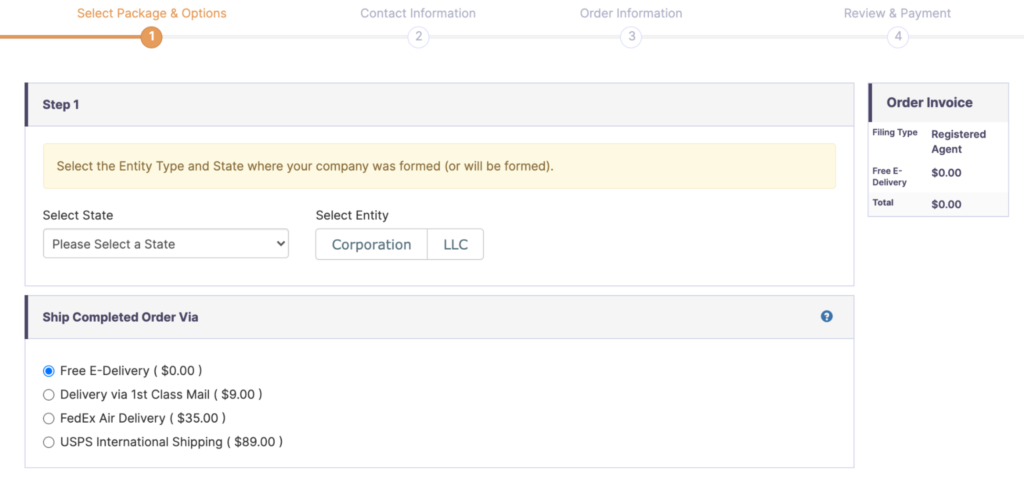
Disclosure: Our content is reader-supported, which means we earn commissions from links on Quick Sprout. Commissions do not affect our editorial evaluations or opinions.
The vast majority of legal business entities in the United States are required to appoint a registered agent.
Whether you’re running an LLC or a corporation, you initially named your registered agent during the business formation process with your state.
But like many aspects of running a business, things change—the day has come where you’ve decided to switch registered agents.
Many business owners are concerned about this process due to the paperwork, fees, and potential compliance issues.
Fortunately, it’s really easy to change registered agents—and this guide will teach you how.
Regardless of your state or business type, this is the easiest way to change registered agents:
There’s no shortage of registered agent services available on the market today. These are ideal options for anyone that needs a new registered agent, as the service will handle the paperwork and filings on your behalf. All you have to do is sign up, and they’ll take care of the rest.
Obviously, there’s a reason you want to change registered agents. You can use your previous experience to identify what you’re looking for in a new registered agent.
Most businesses don’t change registered agents more than once. So this is likely the only time you’ll be going through this process. You can put your registered agent service on auto-renew and basically forget about it after the switch is finalized.
Changing registered agents usually comes with some extra fees. There are fees imposed at the state level and additional fees imposed by the registered agents. The exact cost will vary depending on your state, entity type, and agent service.
For example, LLCs and corporations alike in Illinois must pay a $75 fee to the Illinois secretary of state if they submit a statement of change online. But in California, the fee is $20 for LLCs and $25 for corporations.
As previously mentioned, many registered agent services also impose a fee when you switch to them. This is an added cost on top of the state-specific forms.
You likely won’t get a discount or promotional rate for switching either. Lots of registered agents offer the first year of service for free or 25% off when you use their business formation service. But since your business has already been formed, you won’t be eligible for this type of promo.
If you’re ending the relationship with your existing registered agent, you likely won’t get refunded for the year. For those of you who committed to multi-year contracts, those payments are likely non-refundable too.
You’ll also need to make sure you remain compliant with state guidelines before, during, or after the switch. There can’t ever be a scenario where you don’t have a registered agent on file with your state.
The first thing you need to do is identify why you’re changing registered agents.
To be clear, the state won’t ask for this information, and you don’t necessarily need to give your current registered agent a reason. But this step will make it easier for you to find a registered agent that accommodates your new needs.
Let’s quickly cover some of the top reasons why businesses change registered agents.
This is by far the number one reason that we’ve seen. During the initial business formation process, many entrepreneurs just list themselves as the registered agent when filing paperwork with the state.
Maybe you weren’t sure of the registered agent’s role, or maybe you were just trying to cut costs or get through the registration process quickly.
But if you or a business partner is appointed as the registered agent for your business, that person needs to be available at all times during normal business hours to receive government correspondence and service of process on behalf of the company.
Most business owners eventually realize this isn’t very realistic and decide to use a third-party registered agent service.
It’s possible that your current registered agent notified you about terminating the relationship. This isn’t as common, but it does happen.
Usually, this happens if you fail to pay your annual dues. Most registered agents will give you a little bit of leeway here, but others might automatically cancel the service.
If this is the case, and you’re happy with the service, see if they’ll take you back after paying. The best registered agents can typically keep a credit card on file and put you on auto-renew each year. So you won’t have to worry about doing this manually.
For those of you using a small or local registered agent, it’s possible those companies are going out of business or switching operations. Some lawyers also offer registered agent services in the state where they practice. But if that office is now working from home, nobody will be there to perform the duties required.
Some businesses just have a bad experience with registered agents. Like any product or service on the market, this is bound to happen.
For example, let’s say you were relying on your registered agent to forward you important mail or government correspondence. But you never got the documents, and it led to a fine or a penalty for non-compliance.
That’s a pretty good reason to be upset with your registered agent, and this type of situation definitely warrants a switch.
Or maybe you can’t log into your online dashboard to access important documents. There are other registered agents out there offering a more seamless experience.
Your current registered agent might only be sufficient in your current state. But if you’re expanding operations across state lines, then you’ll need to make a switch.
This is a common occurrence if you’ve appointed yourself or a business associate as your registered agent. Appointing a local business entity as your agent would also be a problem here.
That’s because most states require the registered agent to be an individual who lives in the state or an entity licensed to do business in that state.
Based on your reason from step one, you should have a pretty good idea of what you’re looking for in your next registered agent. Here’s how you can narrow down your options even further:
The most important part of appointing a registered agent is staying compliant. So you need to familiarize yourself with the exact guidelines in your state.
Know who can be your registered agent and what responsibilities that person or entity needs to abide by.
This is really important if you’re planning on naming a person or local LLC as the registered agent. Any mainstream registered agent service will have you covered here. You just need to verify that they offer services in your state and any states you plan on expanding to.
All registered agents perform the same basic duties. They’re listed as the official address for service of process and government correspondence. Someone must be physically present at that address to receive in-person documents on behalf of your business.
That’s just the bare minimum. The best registered agents offer additional services and add-ons to sweeten the deal.

In addition to the features listed above, MyCompanyWorks also offers lifetime company alerts as part of its registered agent service. This means they’ll always remind you about upcoming deadlines and important filings, like annual reports.
You can also manage all of your documents through an easy-to-use online dashboard.
If these types of features are important to you, then you’ll definitely want to switch to a national registered agent service.
Now it’s time to finalize your decision and select a new registered agent. While there are thousands of agents to choose from, you’ll have three general options to consider:
If you had a bad experience with another entity, person, or service in the past, you might be tempted to just be your own registered agent. We strongly advise against that.
Being your own registered agent means you must be available in person during all normal business hours. Failing to do this can cause problems for your business with state compliance.
It’s also embarrassing to get served with paperwork for a lawsuit in front of employees and customers. We’re sure you don’t want people knocking on the front door of your home with this either.
There are lots of local entities that provide registered agent services. These are known as noncommercial registered agents.
Sometimes lawyers, accountants, and other business professional services can be the registered agent for their clients. But don’t expect this to go smoothly, especially if being a registered agent isn’t the primary service.
You could also run into problems here if you plan on expanding into new states down the road.
National registered agent services and commercial registered agents are always the best options to consider. When you switch to MyCompanyWorks, they simplify the state filings and include all fees in your base price.
You just need to fill out some basic information about your business using an online form, and they’ll take care of the rest.

Based on the state or states you select, you’ll get an estimated time window for when the change will be processed.
You can track your order online, and rest easy knowing that MyCompanyWorks ensures statutory compliance.
After you finalize your decision and pay the appropriate fees to your new registered agent, you need to notify your state. There’s some paperwork involved with this step.
Depending on your state and entity type, there are different forms that you need to fill out to make the change official. Common terms for these forms include:
Some states also require a specific cover letter if you’re faxing or mailing a change of agent form. If you’re switching to a registered agent service, they’ll handle this for you.
You’ll also need to make sure you update your registered agent information on annual reports filed with your state. These forms aren’t required in all 50 states, but many states have some version of one.
Last but not least, you need to let the existing registered agent know that you’ve moved on. While this may not be an official state requirement, it’s the right thing to do.
If you forget to inform your previous registered agent about the change, you could end up getting billed for services that you no longer need. So it’s in your best interest to officially terminate the relationship.
Make sure you do this step last. If you do it before you’ve officially changed registered agents, you could expose yourself to state compliance issues.
As you can see the process surrounding changing registered agents isn’t difficult but it is complex. That’s why its crucial to ensure you choose a registered agent for your company that will give you the peace of mind you deserve.
Come with a Question.
Leave with a Solution.
Every day, we help people discover products and services that can help their business bloom.

The Quick Sprout Promise
Quick Sprout publishes original work by writers in the B2B space. All reviews are edited and fact-checked internally before publication. We will never gate an article or ask our readers to pay for our content.
Quick Sprout publishes original work by writers in the B2B space. All reviews are edited and fact-checked internally before publication. We will never gate an article or ask our readers to pay for our content.